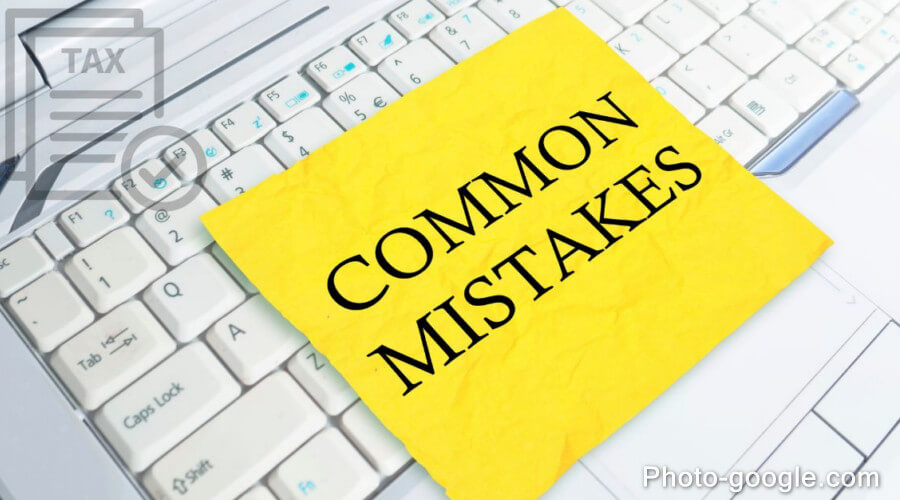In this 2025 guide, we’ll cover the top mistakes to watch for, along with tax return tips that ensure a smooth and accurate filing experience.
1. Missing or Incorrect Personal Information
One of the simplest yet most common tax filing mistakes is submitting incorrect personal details. Errors in your Social Security number, address, or bank information can delay your refund or even cause your tax return to be rejected.
Always double-check that your name and Social Security number match your records exactly. For married couples, ensure your filing status (jointly or separately) is correct. Mismatched or outdated bank account numbers for direct deposit are another frequent issue that can hold up your refund for weeks.
According to the IRS, up to 30% of delayed refunds result from basic data entry errors. Taking a few extra minutes to review these details before submission can save you unnecessary frustration.
2. Forgetting to Report All Sources of Income
In the gig economy era, more people have multiple income streams — side hustles, freelance projects, or investment dividends. Forgetting to include all income sources is one of the biggest common tax errors that can trigger an audit.
If you receive Form W-2 from your employer and multiple 1099 forms from freelance clients, make sure every form is accounted for. Digital platforms like Upwork and Fiverr report your earnings to the IRS, so discrepancies between your return and reported income can raise red flags.
Use tools such as TurboTax or H&R Block to import your income documents automatically. Keeping a digital spreadsheet of all earnings throughout the year can also help prevent mistakes.
3. Overlooking Deductions and Credits
Missing out on deductions and credits is another costly tax return mistake. Many taxpayers leave money on the table simply because they’re unaware of available deductions for expenses such as education, medical bills, or home offices.
In 2025, some of the most valuable deductions include:
- Child Tax Credit for dependent children under 17.
- Education Credits such as the American Opportunity and Lifetime Learning credits.
- Home Office Deduction for freelancers and remote workers.
- Retirement Contributions through IRAs or 401(k)s.
Always verify eligibility using trusted sources like Investopedia or the official IRS Credits and Deductions page. A professional tax advisor can also help identify credits specific to your financial situation.
4. Filing Late or Missing Deadlines
Filing your taxes after the April 15 deadline is a surefire way to incur penalties. The IRS charges both a late filing fee (5% per month of unpaid taxes) and a late payment penalty. These fees can add up quickly and significantly increase your tax liability.
If you anticipate delays, request an extension by filing Form 4868. This gives you until October to submit your return — but remember, it doesn’t extend the payment deadline. You still need to estimate and pay what you owe by April 15 to avoid interest charges.
Setting reminders or using calendar alerts can help you stay on top of these deadlines. For more deadline management tips, visit NerdWallet Tax Guide.
5. Miscalculating Income or Deductions
Manual math errors continue to plague taxpayers every year. Even with software, incorrect data entry can lead to over- or under-reporting income or deductions. These tax filing mistakes may result in smaller refunds or even IRS notices for adjustments.
Double-check every figure entered on your tax return. Online tax software such as Cash App Taxes and Credit Karma Tax automatically calculate totals and flag inconsistencies before you file. This minimizes errors and ensures accurate submission.
Comparing your current return with last year’s can also help identify major discrepancies in reported income or deductions, providing an extra safeguard.
6. Forgetting to Sign and Date the Return
It might sound trivial, but thousands of taxpayers forget to sign their returns each year. The IRS treats unsigned returns as invalid, meaning they’re not considered filed at all. Whether you’re submitting electronically or on paper, always ensure every required signature is included.
For joint filings, both spouses must sign. E-filers will use an electronic PIN or password to verify identity. Forgetting this final step could delay refunds and trigger unnecessary complications.
For a step-by-step checklist before filing, check out Consumer Finance Tax Tips.
7. Not Keeping Proper Tax Records
Once you file your return, don’t toss the paperwork. Keeping detailed tax records for at least three years protects you in case of audits, errors, or future claims. Essential documents include W-2s, 1099s, receipts for deductible expenses, and proof of charitable donations.
Store these digitally using secure cloud platforms like Google Drive or Dropbox. Organized records also simplify next year’s filing process and ensure accuracy if you ever need to amend a return.
For small business owners or freelancers, maintaining a digital record-keeping system can also support financial management and business deductions throughout the year.
Additional Tax Return Tips for 2025
To minimize common tax errors and improve your filing experience, follow these simple but effective tax return tips:
- File electronically to reduce manual mistakes and speed up refunds.
- Review your bank account details for accuracy before submitting.
- Track all tax-deductible expenses throughout the year with digital tools like Mint or Expensify.
- Consider consulting a CPA for complex filings or major life changes (marriage, home purchase, or new business).
- Use IRS Free File if your income qualifies — it’s an easy, no-cost way to ensure accurate filing.
For more detailed tax planning advice, visit Smart Tax Strategies (example.com) or explore Financial Planning Hub (example.com).
Conclusion: Avoid Mistakes, Maximize Your Refund
Filing taxes doesn’t have to be stressful or costly — as long as you stay aware of these common tax errors. From verifying personal information to claiming every eligible deduction, small steps can lead to big savings and smoother processing.
By following these tax return tips and using trusted tools, you can confidently file your taxes in 2025 while minimizing risks. Remember: accuracy, organization, and attention to detail are your best allies during tax season.




